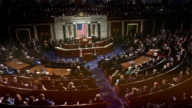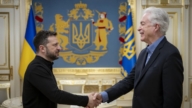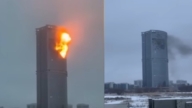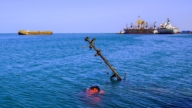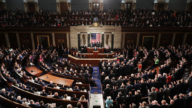【新唐人2014年05月24日訊】俄羅斯總統普京訪華的最後一天,中共和俄羅斯簽署了高達4000億美元的天然氣合同。未來30年,俄羅斯將每年向中國提供多達380億立方米的天然氣。分析指出,兩國歷經10年的談判後,在這個時候達成協議,與最近俄羅斯受到歐美制裁以及兩國的政治體制相似有關。
5月21號,中共和俄羅斯在上海簽署了史上最大規模的能源合作單項購銷合同。根據協議,俄羅斯將從2018年起,通過中、俄天然氣管道東線向中國供氣,輸氣量逐年增長,最終達到每年380億立方米,纍計30年。
俄國媒體披露,這份合同的總價達4000億美元,對華供氣價格超過每千立方米350美元。
據了解,從2004年開始,中共和俄羅斯就進行天然氣談判,但供氣價格及定價機制一直是談判的障礙。有消息人士透露,俄羅斯曾經希望,賣給中國的價格能和賣給日本的價格掛鉤,達到最高約每千立方米500美金。然而受烏克蘭局勢影響,俄羅斯已經感受到來自歐洲的制裁壓力,必須降低價格,擴大亞洲市場。
台灣政治大學國際關係研究中心主任嚴震生:「跟中國簽了之後,至少它(俄羅斯)不會擔心,萬一不賣歐洲的話,至少還有一個中國,它少賺了錢,但是穩住了一個很重要的戰略夥伴。畢竟去年習近平主席第一個出訪就到俄羅斯。過去出訪都是強調和平共處原則,尊重國家的主權跟領土的完整,但烏克蘭這個事情在克里米亞,他(習近平)沒有支持西方國家和聯合國安理會協調,也算是給俄羅斯很大的一個幫忙。」
美國紐約城市大學政治學教授夏明:「現在俄國跟歐洲的關係出現了緊張局勢,在這種情況下,它是看好中國。中國的能源需求,在過去30年呈直線型成長,中國在尋求能源安全上有一種強烈的焦慮感,中國當然希望,未來有一個比較穩定的能源的供給。能源,尤其是石油,供給國都是非常不穩的,最近中國的另外一個能源供給大國緬甸,有一種遠離中國,更多的像西方靠攏的跡象。」
5月22號,德國《法蘭克福匯報》一篇文章指出,同中共達成的供氣協議有助於使俄羅斯擺脫對於歐洲的依賴,而中俄兩國政體類似、領導人分享相同的價值觀,是做成這一買賣的現實基礎。
文章說,兩位領導人都對美國在兩國各自的利益圈內的活動不滿,害怕美國所秉承的理念對各自國家的影響力。
夏明:「兩個國家都面臨了以美國為首的西方國家在東西兩邊對它們進行包括經濟制裁、政治上的批評、圍堵等等,這些國家必然想尋求一種合作。」
嚴震生:「我認為這是面對亞太的圍堵,美國在亞太地區,也是一種對俄羅斯的一個新的圍堵,這兩個大陸的強國自然會靠在一起,而且俄羅斯有個問題,雖然它已經進入世界八大工業國,但是它總認為,它的民主是受到批判的。」
不過,德媒文章強調,儘管中俄有著共同的意識形態,雙方最終仍然受各自利益的驅使。
據《美聯社》報導,雙方就供氣價格問題的討價還價,一直持續到普京訪華結束前的最後幾個小時。
據報導,儘管中共當局渴望進一步分散石油和天然氣的供應來源,但它很清楚,中美雙邊貿易的規模是中俄貿易的3倍,中共仍希望與美國建立大國間的關係。
俄羅斯也不願過深涉入中共戰略。在中、日島嶼之爭中,俄羅斯保持中立,也不願介入中共與南海諸鄰國之間的衝突。
美國「哥倫比亞大學」訪問學者陳破空在博文中指出,俄國因入侵烏克蘭、吞併克里米亞,遭到西方制裁,與日本的關係有所惡化,但若要說,俄國會與中共聯手對抗日本,還差得太遠。在東海聯合軍演,俄國頂多是給了中共一次「面子」。其實各有所圖:中共主要演給日本看,俄國主要演給美國看。
採訪/陳漢 編輯/陳潔 後製/蕭宇
China and Russia Energy Deal Against the United States
On Putin’s last day visiting China, a $400 billion natural gas
contract was signed that binds 38 billion cubic meters of gas
annually from Russia to China for the next 30 years.
Analysts believe this decade long negotiation between China
and Russia on energy finally went through because of the
EU and US sanctions against Russia and the similar political
systems of the two countries.
On May 21, China and Russia signed a landmark $400 billion
natural gas deal in Shanghai.
Starting from 2018, Russia will supply China up to 38 billion
cubic meters of gas annually for 30 years.
Russian media reported the contract of $400 billion will
supply China natural gas at prices exceeding $350 per
thousand cubic meters.
China and Russia have engaged in the gas price negotiation
since 2004.
Insiders revealed that Russia was hoping to sell China the gas
at a price comparable to the price to Japan, i.e., $500 per
thousand cubic meters.
However, the EU sanctions against the Ukraine issue has forced
Russia to cut the price to expand its market in Asia.
Yan Zhensheng, Research Fellow, Institute of International
Relations, Taiwan Chengchi University: “The contract assures
Russia that even though the money is less, it secures a
major strategic partner.
After all, Xi Jinping’s first overseas visit was to Russia.
Even though stressing the principles of peaceful coexistence,
respect for sovereignty with the territorial integrity of the
country, Xi’s silence on the Crimea issue from the Western
countries and the UN Security Council, can be considered a
great help to Russia."
Professor Xia Ming, Political Science, The City University of
New York: “Russia’s tension with EU relies on China now.
The linear growth of energy demand in China for the past 30 years
has brought intense anxiety to the Chinese.
A secure energy supply has been China’s hope.
The suppliers, especially in oil, have been very unstable to China.
Take the main energy supplier, Myanmar, as an example,
has been keeping a distance from China, and more likely
moving towards the West."
On May 22, an article in the German Frankfurter Allgemeine
Zeitung indicated that the gas supply agreement helped Russia
to shrug off its dependence on the EU.
The similarity in governments and leadership values are the
foundation for the success of this trading.
The article said that both leaders are offended by U.S.
activities in their circles of interests, and threatened by
U.S. ideology and influence.
Xia Ming: “Both countries are faced with the containment,
both economic sanction and political criticism, by the US-led
countries from the East and the West.
Therefore, they seek each other’s help."
Yan Zhensheng: “I believe this containment in Asia is new to
Russia too.
These two major powers of the two continents will naturally
come together.
Russia is also faced with another issue. That is, even though
listed in the world’s eight industrialized nations, Russia seems
to always be subject to criticism of its democracy."
However, the German media article emphasized that although
China and Russia have a common ideology, the two are still
ultimately driven by their own interests.
Associated Press has reported that gas prices have remained
the issue of bargain until the few hours before the end of
Putin’s visit.
It is reported that although Communist China desires to
further diversify sources of supply of oil and natural gas,
clearly the Sino-US trade scale is three times the Sino-Russian
trade.
The Chinese Communist Party still hopes to establish relations
with the United States.
Russia is also reluctant to get deeply involved in the CCP’s
strategy.
Russia has remained neutral in the islands dispute between
China and Japan, and the conflict between China and
neighboring countries in the South China Sea.
Columbia University visiting scholar Chen Pokong stated in
his blog that Russia’s invasion of Ukraine and the annexation
of the Crimea have met sanctions from the West, as well as
deteriorated relations with Japan.
However, it is far fetched to say that Russia will unitewith China
against Japan.
The joint military exercises in the East China Sea are simply
a facade for the CCP.
In fact, both countries put on the show with their own
propaganda: The CCP is to show to Japan,
while Russia is to show to the United States.
Interview/Chen Han Edit/Chen Jie Post-Production/Xiao Yu




